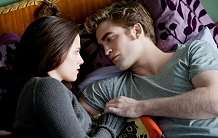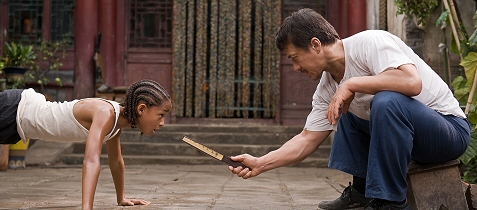There’s some sadness hanging over the American film world this morning due to the tragic and disturbing death of highly respected 39 year-old editor Karen Schmeer, best known for her work on Errol Morris projects as “Fast, Cheap, and Out of Control,” “Mr. Death,” and “The Fog of War.” (Shawn Levy of The Oregonian has much about piece her shockingly random death in a crime-related automotive accident, her work, and her early start in the documentary film business.)
Nevertheless, the awards beat goes on and today, as Nikki Finke points out, we can chalk up a big victory for female directors as Kathryn Bigelow of “The Hurt Locker” defeated a boys club of directors that included such ultimate mega-males as Quentin Tarantino and her one-time husband, James Cameron. Bigelow, of course, has been a noted director since her early features, 1982’s “The Loveless,” which introduced Willem Dafoe, and 1987’s ahead-of-its-time vampire drama, “Near Dark” attracted the attention of genre friendly critics. Her best known film, ironically enough, is probably the silly action flick, “Point Break,” which has emerged as a culty guilty pleasure after its 1991 release.

“The Hurt Locker” is the first time Bigelow has been associated a project to get this kind of near-universal acclaim. It’s a major departure stylistically from her often slick and superficial past work, looking at an unexploded bomb team with the same kind of dispassionate intensity as “The French Connection” examined police work. This award definitely makes Bigelow the apparent favorite for the Best Director Oscar. It also doesn’t hurt it’s chances at the Best Picture award either.
“Hurt Locker” also swept the Producers Guild award earlier this week. Similar to the DGA, that award is widely seen as a harbinger for the “Best Picture” category, in which the producer is the one who actually receives the award. Still, as Dave Karger reminds us, the DGA doesn’t make the award inevitable. Also with the nominees this year doubled to ten and a more complex voting system for “Best Picture” that category, at least, remains open to any of the four or five most frequently nominated films in my opinion.
In other awards, “The Cove” got a boost in the nevertheless very hard-to-predict documentary Oscar category with an award for its director, Louie Psihoyos. I usually don’t cover TV, but it is worth a mention that the winner of the award for direction in a TV drama series was also won by a woman. Lesli Linka Glatter was awarded for her work on the action-packed “Guy Walks Into An Advertising Agency” episode of “Mad Men.” Not a bad choice.
Meanwhile, over in Park City, Utah, the Sundance Film Festival presented its awards, which offer a fairly significant peak into what are likely to be some of the most acclaimed and potentially award-winning films of the next year or so. Young people with family ties to crime seemed to be a winning theme in the dramatic categories: “Winter’s Bone,” about a young girl in search of her crystal meth manufacturing father, won the U.S. Prize; the Australian crime drama “Animal Kingdom,” about a teen boy born into a crime family in 1980s Melbourne, took the international award.
The documentary award went to one of the festival’s most high profile entries, “Restrepo.” From two-first first-time directors, journalist/author Sebastian Junger (the book, The Perfect Storm) and documentary cinematographer Tim Hetherington. The film is follows a U.S. Army platoon in Afghanistan for a year. As the offical Sundance description has it, it depicts a “surreal combination of back breaking labor, deadly firefights, and camaraderie….” Indiewire’s Eugene Hernandez has a complete rundown.

 Over the three day Friday-Sunday weekend, Summit’s “The Twilight Saga: Eclipse” earned an estimated $69 million according to the Box Office Mojo chart. For the broader and potentially confusing numbers covering the extended movie weekends for the two new major new releases this week, I’ll rely on Anne Thompson’s pal Anthony D’Alessandro. He tells us “Eclipse” earned an estimated $175 million and change, just a few million bucks below the similar six-day frame of 2004’s “Spiderman 2,” though not adjusted for ongoing movie-ticket inflation.
Over the three day Friday-Sunday weekend, Summit’s “The Twilight Saga: Eclipse” earned an estimated $69 million according to the Box Office Mojo chart. For the broader and potentially confusing numbers covering the extended movie weekends for the two new major new releases this week, I’ll rely on Anne Thompson’s pal Anthony D’Alessandro. He tells us “Eclipse” earned an estimated $175 million and change, just a few million bucks below the similar six-day frame of 2004’s “Spiderman 2,” though not adjusted for ongoing movie-ticket inflation.



